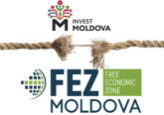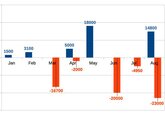
Running "with obstacles": the main events and trends of 2021 in Moldova
Commentary by InfoMarket Agency
In the chronicle of 2021, we have captured hundreds of events, thousands of facts, many promises and concrete actions. And although "bad news runs and good news limps along," there were still many positive moments in the passing year. And the traditional results of the year are just an attempt to reflect the general mood, trends and prospects, which set the outgoing year.
InfoMarket agency presents the most resonant events and trends of 2021.
The economy is recovering from a steep decline in 2020 caused by the COVID-19 pandemic and drought. In 9M 2021, Moldova's GDP reached 174.1 billion lei, or 10.3% more than in the same period in 2020. In the same period of 2020, an 8.2% year-on-year GDP decline was recorded. The main growth factors were favorable conditions for the agrarian sector, improvement of the economic situation in Moldova's partner countries, recovery of consumption and private investments, stabilization of the political situation - all three institutions of power got leverages to effectively govern the country. But it is too early to speak about the quality of economic growth. The largest contribution (almost 20%) to the formation of Moldova's GDP in 9M 2021 were the wholesale and retail trade, maintenance and repair of motor vehicles and motorcycles, transport and storage, accommodation and public catering activities. The government expects Moldovan GDP to grow by 7.5% in 2021 and forecasts an economic growth of 4.5% in 2022. Similar figures are forecasted by the IMF. The EBRD has a slightly less restrained forecast (7% and 4% economic growth, respectively).
The COVID-19 pandemic: no end in sight. Since the pandemic outbreak in Moldova, the coronavirus was confirmed in 375 thousand people, 2.5% of them died from complications, caused by the virus. In 2021, more than 6.8 thousand people became victims of the virus (for comparison, in March-December last year - 2.8 thousand). The Ministry of Health expects another wave of infections, while continuing to promote vaccination as the only way to overcome the pandemic. In March 2021, Moldova became the first country in Europe to receive free coronavirus vaccines through the COVAX platform. More than 2.6 million doses from seven manufacturers have been delivered to the country, and 66% of them have already been used. But only 28.5% of Moldova’s population has been fully vaccinated. The already great public distrust in respect of vaccines was heated up by the Accounts Chamber, which, as part of an audit of the vaccination management process, revealed many violations. For example, it found that more than 7,000 expired vaccines had been used, 2,500 people had been vaccinated out of turn, and 71,000 vaccination certificates were suspected of being fake.
The state of emergency was introduced twice in 2021. At the request of the government in the spring, the parliament approved a decision to introduce the state of emergency in the country for the period from April 1 to May 30. This allowed the government to be empowered to manage the coronavirus pandemic without protests or litigation. Especially since, at that time, the statistics of new COVID-19 infections were reaching record highs. But at the end of April, the Constitutional Court (CC) declared this decision unconstitutional and the state of emergency was cancelled. On the same day, Moldovan President Maia Sandu signed a decree dissolving Parliament and calling snap parliamentary elections (which was impossible during the state of emergency). Another state of emergency was declared in autumn, from October 22 to November 20, in connection with the gas crisis. This allowed the authorities to use the necessary tools and levers to quickly overcome the gas crisis; to take urgent measures and decisions, derogating from normative acts, which are extremely important for ensuring the energy security of the country; to allocate financial resources in order to purchase gas from alternative sources.
Snap parliamentary elections. The Action and Solidarity Party (PAS) won the July 11 snap parliamentary elections with 52.8% of the vote, enabling PAS to form a parliamentary majority, approve the (re)nomination of Natalia Gavrilita as Prime Minister, and confirm the powers of the new government she formed. The Electoral Bloc of Communists and Socialists won 27.17% of the votes, the SOR Party - 5.74%, and the remaining political formations did not pass the electoral threshold of 5% to enter the parliament. The new parliament consists of 63 PAS MPs, 32 MPs from the PCRM and PSRM electoral bloc and 6 SOR Party MPs.
The gas crisis is the first difficult case. The Moldovan authorities hoped that the contract with Gazprom, signed earlier, would be prolonged on the same terms. But a force majeure situation arose: the formula with the partial reference to the spot prices is unprofitable for Moldova against the background of the unprecedented growth of the stock prices. Last but not least, there was the political factor - the anti-Russian statements of the President of Moldova on the “Crimea Platform.” After difficult negotiations the parties agreed to prolong the contract until September 30, 2026. But this was preceded by the introduction of the state of emergency because of the gas crisis, gas saving at enterprises, search for alternative sources of gas and even the first such purchase. According to the agreements, Gazprom will supply Moldova with 3.3 billion cubic meters of gas until October 2022, including 2.06 billion cubic meters for the consumers on the left bank of Dniester River. At the same time uncomfortable questions in the Moldovan-Russian gas relations were touched upon: historical debts for gas and conditions of gas supply to the Transnistrian region. For the first time in Moldova, the authorities decided to carry out a public audit of the natural gas sector.
The IMF approved a new economic reform program for Moldova. On December 20, the IMF executive board approved Moldova’s request to sign an agreement on an economic reform program. The total amount of payments under the 40-month program will be about $558.3 million. The new IMF program is aimed at supporting the recovery from COVID-19, meeting urgent development needs and strengthening Moldova's institutional framework. Key reforms relate to enhancing transparency and accountability, improving the predictability of public policies, consolidating financial institutions and encouraging competition. As usual, the program with the IMF is a positive signal for other external partners. In December, the European Union provided Moldova with a grant of 60 million euros (1.2 billion lei) to help the population cope with rising gas prices. The grant complements the EU assistance to Moldova's energy sector. The EBRD, EIB and EU will provide 75 million euros for a project to improve energy efficiency in Moldovan public buildings. Poland is ready to lend Moldova $100 million for economic development projects, etc.
Inflation goes beyond the established corridor. In November 2021, monthly inflation in Moldova was 3.5%, annual inflation (in the last 12 months) - 12.44%, and in January-November this year – 12.08%. The prices and tariffs for housing services (gas, heating, water heating), cab and beauty services, cell phones, food, construction materials, diesel fuel, clothing, shoes, etc. rose. The average salary also rose. In the third quarter, the average salary in the country was about 9,176 lei, or 13.6% more than in the same period last year. But, as it turned out, the salary of half of Moldova’s workers does not reach 7 thousand lei (including 6.5% receives up to 3 thousand lei). To support the population, the authorities have adopted a law to compensate the price difference for consumption of natural gas/heat energy in the cold period of the year and will allocate for this purpose more than 1 billion lei. Also, the minimum monthly income, which is a basis for low-income families to apply for assistance during the cold period of the year, has been raised from 2,631.2 lei to 3,109.6 lei. In addition, from October 1, the size of the minimum pension was increased to 2 thousand lei, and all pensions and social payments were indexed by 3.86%, which, according to the authorities, is also a certain support...
Laws and creativity. A year after the reduction of the retirement age at the suggestion of the PSRM, Moldova is again returning to the pension reform initiated several years ago. Since January 1, 2022, the standard pension age will again be 63 years - for men since 2022, for women - since July 1, 2028. The standard pensionable service - up to 34 years will increase and the right to an early retirement will be introduced. Not without incidents, the VAT rate in the HoReCa sector was reduced - from 12% to 6%, but only for the period of emergency states and emergency in health care: the controversial issue about the effective date of this measure of support for the industry was solved by an additional bill. The Law on the Market of Petroleum Products underwent changes. In 2021 ANRE repeatedly adjusted the Pricing Methodology for petroleum products in order to prevent a crisis in this market. And in August the parliament voted for the liberalization of prices, with the exception of standard petroleum products, and now ANRE sets price limits only for A-95 gasoline and diesel fuel. But that is not all: a bill that will again make changes in the industry was approved in the first reading. It provides for a moratorium on the construction of new gas stations, the abolition of the fixed import and wholesale license fee of 260 thousand lei per year, a10 times increase in the amount of fines charged from oil companies for violating the law, a ban on the wholesale resale of petroleum products. The important topics include the law on the abolition of "offshore secrecy" or amendments to the law on domestic trade. This year the package of laws on budgetary and fiscal policy for the next year was approved twice: the stumbling block was the increase of judges' salaries and lack of financial coverage for this purpose. And the fact which was not quite clear was the increased attention to the sphere of gambling - the introduction of a complete ban on advertising of all kinds of gambling, probably just the beginning of another story about cleaning up the market or "freeing citizens" from their pernicious habits. An absolutely ridiculous fact is the repeated deprivation of Ilan Shor of MP immunity and the confirmation of intentions to extradite him to Moldova.
The arrest of the Prosecutor General and democratic ways to control the justice system. The fight against corruption and the reform of justice were declared as priorities by the new authorities. But attempting to create a state governed by the rule of law while violating its own norms is not the best tactic. Thus, a new law on the Prosecutor's Office was passed, which allowed for the possibility of firing the Prosecutor General, reformatting the composition of the Supreme Council of Prosecutors, and legalizing the procedure for removing the Prosecutor General if a criminal case was opened against him. Despite the recommendations of the Venice Commission on this issue, the law has not yet been changed, and the criminal proceedings against ex-Prosecutor General Stoianoglo continue. Or, for example, the system worked smoothly in the local elections in Balti, when Marina Tauber, a candidate from the SOR party, was urgently removed from the second round.
The Diaspora is a separate area on the government's agenda. Among other important priorities, the new government's agenda includes a whole section on relations with the Diaspora and policy-making in this area. The authorities plan to intensify cooperation with members of the Diaspora in all fields; to facilitate access to quality consular services and e-services via MPay for citizens abroad. A national program is being developed to encourage the return and (re)integration of Moldovan citizens involved in the migration process; mechanisms are being considered for Diaspora’s co-financing of national projects; ways to attract migrants' savings to the country's economy are being explored. We remind that the Diaspora provided almost 16% of the votes in the second round of presidential elections and more than 14% of the votes in the snap parliamentary elections. The PAS and Maia Sandu received most of the Diaspora's votes both times.
For the first time... In 2021, the Moldovan Ministry of Finance issued and successfully placed 7-year government bonds for the first time in the history of the country. For the first time in the capital market of Moldova, municipal bonds were issued and the proceeds from their sale will be used by the local authorities (Chisinau, Singera and Ceadir-Lunga) for investment projects. In early October, the foreign currency reserves of the NBM exceeded the record figure of $4 billion. For the first time, Moldova received the authorization to export dairy products to European Union countries... Also, new private investments have been announced. For instance, resident of the Balti Free Economic Zone, Swiss company Schoeni will invest 1.5 million euro in building a fruit and vegetables processing factory in Moldova; Austrian & Griller Group - 12 million euro in expanding production and creating 500 new jobs; OmniSteel will build a mini steel factory, with 14 million euro in investments; investors announced the creation of a solar panel park in southern Moldova, etc.
The 2022 may become a year of opportunities both for the authorities and the private sector, as well as for Moldova’s population, if everyone focuses on the content and quality, not just on the form and quantity. The main thing is - not to stop and continue along the chosen path.





